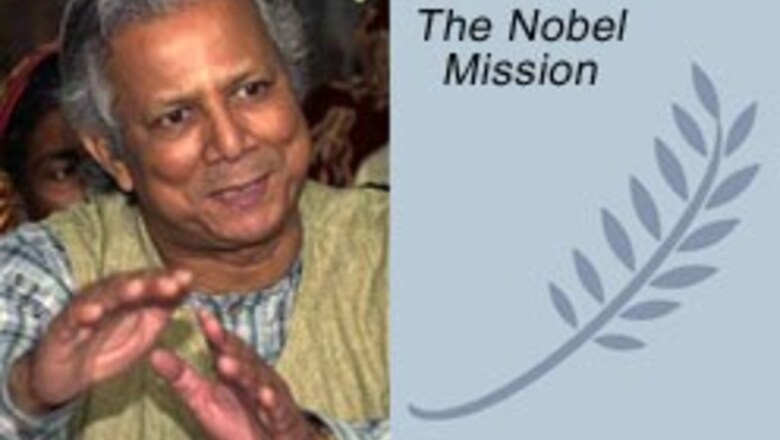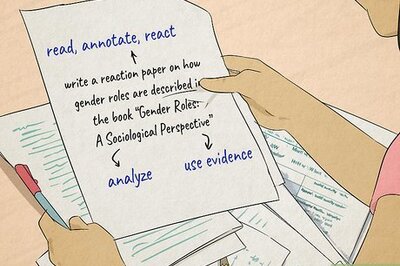
views
New Delhi: Prof Muhammad Yunus, founder of Grameen Bank of Bangladesh, and the bank itself were, on Friday, named joint recipients of the Nobel Peace Prize "for their efforts to create economic and social development from below".
The prize carries 10 million Swedish crowns ($1.36 million) and the Nobel citation. The money will be distributed equally between the bank and its founder.
Ole Danbolt Mjoes, the head of the secretive Norwegian Nobel Committee, made the announcement in Oslo on Friday from a secret list of 191 nominees, rounding off this year's Nobel awards from medicine to literature.
''Across cultures and civilisations, Yunus and Grameen Bank have shown that even the poorest of the poor can work to bring about their own development,'' the secretive five-member committee said while announcing the award.
''Lasting peace cannot be achieved unless large population groups find ways in which to break out of poverty,'' it said, adding Yunus's goal was to end poverty in the world.
''This is fantastic, unbelievable. Thank you,'' Yunus told Norway's NRK television after the prize announcement.
Prof Muhammad Yunus is a banker, an economist and the developer and founder of the concept of microcredit in the country or the extension of small loans to entrepreneurs too poor to qualify for traditional bank loans.
He started the Grameen Bank of Bangladesh after being horrified by the plight of villagers struck by a famine in Chittagong in 1976.
He envisaged a bank which could do away with guarantees, provide small loans which conventional banks do not provide and bind small group of people, especially women, together and make them group guarantors.
The Bank makes small loans without demanding any collateral.
Twenty-four years later, the Grameen Bank has 1,128 branches, provides services to 38,951 villages and has 23 lakh borrowers.
Over 94 per cent of the borrowers are women. The rate of default is less than five per cent. Grameen Bank has empowered the women in rural Bangladesh.
It has reduced the dependency on husbands and nutritional standards of the children have improved. The birth rates have come down, divorces are fewer and marriages are more stable.
A total of 223 Grameen replication programmes are currently in operation in 58 countries of the world. More than 4000 people have undergone Grameen exposure programme.
Independent studies by the World Bank indicate that within five years about half of Grameen’s two million borrowers manage to pull themselves up over the poverty line.
The Grameen Bank has issued more than US$ 5.1 billion to 5.3 million borrowers. To ensure repayment, the bank uses a system of 'solidarity groups'.
These small informal groups apply together for loans and its members act as co-guarantors of repayment and support one another's efforts at economic self-advancement.
PAGE_BREAK
The UN has a goal of halving the proportion of the world's population, about one billion people, living in the deepest poverty by 2015.
The Peace Prize is awarded annually in Oslo, the capital of Norway, unlike the prizes in physics, chemistry, medicine and literature, which are awarded in Stockholm, Sweden.
The Peace Prize should be awarded "to the person who shall have done the most or the best work for fraternity between the nations, for the abolition or reduction of standing armies and for the holding and promotion of peace congresses".
PM congratulates Muhammad Yunus
Prime Minister Manmohan Singh has welcomed the award of Nobel Peace Prize to Bangladesh economist, Muhammad Yunus and congratulated him.
At a meeting with the press after the conclusion of the 7th India-EU Summit in Helsinki on Friday Singh said, “Professor Muhammad Yunus was one of my friends and the movement of Micro credit that he has launched has important lessons for tackling poverty, particularly problem of rural poverty. I am happy that world at large has recognised the contribution that Yunus has made to resolving poverty.”
















Comments
0 comment